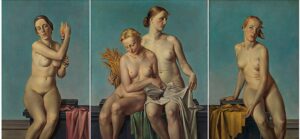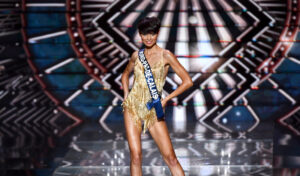I can’t pinpoint the exact moment I decided to quit my post as an assistant librarian at a private school, but it was most probably when Andersen Press defended its decision to publish a book intended for under-sevens that contained …
Don’t be terrified of Pale Fire
Pale Fire is one of the greatest books I’ve ever read. It is so great it is terrifying to write about. This is not something I would normally confess, but in this case it seems better to just come out …
The Met Gala is a Ballardian nightmare
For weeks now, a timer on the Vogue website has been ticking off the seconds, the anticipation within the fashion world bursting at the seams. But finally: the 2024 Met Gala is here.
There is, however, something different about this …
How to survive the Tory apocalypse
When Ford Madox Ford died in June 1939, a few weeks before Europe compelled itself once again to go to war, only three people turned up to his funeral. In an obituary, Graham Greene compared his fellow writer’s passing to …
PEN America has surrendered over Israel
Another day, another opportunity for huffy, hypocritical “progressive” posturing. PEN America has now been forced to cancel its World Voices literary festival in New York and LA, on the heels of also cancelling its 2024 awards ceremony. Too many authors …
The problem with Byron’s debauchery
In 1798, a lame, rough-mannered 10-year-old boy from Aberdeen called George Gordon Byron inherited a peerage, along with an abbey in Nottinghamshire, and grew up to be one of the most notorious Romantic poets of all time. He died two …
The metaverse of Fernando Pessoa
At the beginning of this year, I visited Lisbon for the first time, and thought I’d enhance the experience by reading some books set in Portugal’s capital. First, I read Nobel-laureate Jose Saramago’s The Year of the Death of Ricardo …
This book will send you to Hell
Last autumn, I finally read a book I’d put off reading for years because I suspected (rightly, it turns out) that it would be uniquely harrowing. Jonathan Littell’s notorious, extremely long novel of the Second World War, The Kindly Ones, …
Why chicks still dig Byronic heroes
Two centuries after his death, Byron is still — like Madonna, Napoleon and Chewbacca — a member of the one-name-only club, even if he’s forced to share it with a hamburger chain. At the time, his death at the age …
Why chicks still dig Byronic heroes
Two centuries after his death, Byron is still — like Madonna, Napoleon and Chewbacca — a member of the one-name-only club, even if he’s forced to share it with a hamburger chain. At the time, his death at the age …
Britain doesn’t need a sick king
If we were living in the world of mythology, King Charles’s cancer might have some dire consequences. It’s possible that the entire economy would collapse, famine would kill off millions of citizens and those who survived might perish of plague. …
Why I imagined my husband’s death
In my new novel, A Book of Days, a husband is dying slowly. While I was writing it, my own husband died suddenly, with no warning. He died in his sleep, I was told. His children and I hope that …
The excoriating comedy of Auschwitz
The most-told joke about Auschwitz surfaces in different forms. As I first heard it while a teenager in “north London” — not just a cluster of adjacent postcodes, of course, but shorthand for a mindset that one kind of pundit …
ChatGPT will kill off the Romantic genius
You have to salute the brass balls of the Japanese literary novelist Rie Kudan. She was accepting one of Japan’s most prestigious literary awards, the Akutagawa Prize. The judges were hosing her new novel, The Tokyo Tower of Sympathy, down …
Why women love lesbian romance
If you’re the fastidious sort who cares about historical accuracy, then you probably aren’t the right audience for Don’t Want You Like A Best Friend. Billed as “a swoon-worthy debut queer Victorian romance”, US author Emma Alban brings us the …



